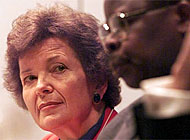Robinson urges business to support human rights

The former United Nations High Commissioner for Human Rights, Mary Robinson, has urged business leaders to do more to promote human rights. Speaking at the World Economic Forum in Davos, she said it was up to big business to ensure that the benefits of globalisation were shared.
Speaking to swissinfo in Davos, Robinson echoed the message of the UN secretary-general, Kofi Annan. In his address to delegates on Sunday, Annan warned business leaders to become better global citizens or face a growing backlash against globalisation.
Robinson said corporations needed to accept that they had a responsibility to promote human rights in trouble spots, and to make the process of globalisation more equitable.
“It’s in the interests of business, especially in the case of countries in conflict or coming out of conflict, that the infrastructure be built up.”
Anti-globalisation protesters have long criticised big business for trampling on human rights for the sake of higher profits. Robinson said that in an age of heightened information exchange, corporations had a vested interest in building decent systems of education, health and justice to establish a solid base for business.
“There is a growing transparency and a human rights network of trade unions, churches and civil society in general which is aware of issues such as child labour and abuse of indigenous peoples and the environment,” she said. “Corporations are aware how quickly their brands can be damaged.”
She sounded an optimistic note, too, saying there were many business leaders willing to work with the UN to promote social progress. “We should recognise those business leaders who are taking the global compact very seriously and have a real commitment to social responsibility.”
Robinson also had a message for the UN. She said it had to develop concrete methods of measuring a company’s commitment to human rights, and that simply having a code of conduct or referring to the Universal Declaration was not enough.
“Companies making profits from the diamond trade in Angola and Sierra Leone or from the oil industry in Sudan are directly complicit or silently complicit in human rights situations.”
Responding to the violent demonstrations surrounding economic summits around the world, Robinson said the protests against globalisation would continue unless business and governments take steps to ensure the benefits are shared.
“There’s a great sense of insecurity and resentment that there is not enough attention paid to those living on less than two dollars a day, and we’re going to see more social tension unless it is addressed.”
by Michael Hollingdale

In compliance with the JTI standards
More: SWI swissinfo.ch certified by the Journalism Trust Initiative








You can find an overview of ongoing debates with our journalists here . Please join us!
If you want to start a conversation about a topic raised in this article or want to report factual errors, email us at english@swissinfo.ch.